Popular The Americas Books
23+ [Hand Picked] Popular Books On The Americas
Discover the list of some best books written on The Americas by popular award winning authors. These book on topic The Americas highly popular among the readers worldwide.

1491: New Revelations of the Americas Before Columbus by Charles C. Mann
In this groundbreaking work of science, history, and archaeology, Charles C. Mann radically alters our understanding of the Americas before the arrival of Columbus in 1492. Contrary to what so many Americans learn in school, the pre-Columbian Indians were not sparsely settled in a pristine wilderness; rather, there were huge numbers of Indians who actively molded and influe In this groundbreaking work of science, history, and archaeology, Charles C. Mann radically alters our understanding of the Americas before the arrival of Columbus in 1492. Contrary to what so many Americans learn in school, the pre-Columbian Indians were not sparsely settled in a pristine wilderness; rather, there were huge numbers of Indians who actively molded and influenced the land around them. The astonishing Aztec capital of Tenochtitlan had running water and immaculately clean streets, and was larger than any contemporary European city. Mexican cultures created corn in a specialized breeding process that it has been called man’s first feat of genetic engineering. Indeed, Indians were not living lightly on the land but were landscaping and manipulating their world in ways that we are only now beginning to understand. Challenging and surprising, this a transformative new look at a rich and fascinating world we only thought we knew.
I WANT TO READ THIS
One Hundred Years of Solitude by Gabriel García Márquez , Gregory Rabassa (Translator)
The brilliant, bestselling, landmark novel that tells the story of the Buendia family, and chronicles the irreconcilable conflict between the desire for solitude and the need for love—in rich, imaginative prose that has come to define an entire genre known as "magical realism."
I WANT TO READ THIS
1493: Uncovering the New World Columbus Created by Charles C. Mann
From the author of 1491—the best-selling study of the pre-Columbian Americas—a deeply engaging new history of the most momentous biological event since the death of the dinosaurs. More than 200 million years ago, geological forces split apart the continents. Isolated from each other, the two halves of the world developed radically different suites of plants and animals. Wh From the author of 1491—the best-selling study of the pre-Columbian Americas—a deeply engaging new history of the most momentous biological event since the death of the dinosaurs. More than 200 million years ago, geological forces split apart the continents. Isolated from each other, the two halves of the world developed radically different suites of plants and animals. When Christopher Columbus set foot in the Americas, he ended that separation at a stroke. Driven by the economic goal of establishing trade with China, he accidentally set off an ecological convulsion as European vessels carried thousands of species to new homes across the oceans. The Columbian Exchange, as researchers call it, is the reason there are tomatoes in Italy, oranges in Florida, chocolates in Switzerland, and chili peppers in Thailand. More important, creatures the colonists knew nothing about hitched along for the ride. Earthworms, mosquitoes, and cockroaches; honeybees, dandelions, and African grasses; bacteria, fungi, and viruses; rats of every description—all of them rushed like eager tourists into lands that had never seen their like before, changing lives and landscapes across the planet. Eight decades after Columbus, a Spaniard named Legazpi succeeded where Columbus had failed. He sailed west to establish continual trade with China, then the richest, most powerful country in the world. In Manila, a city Legazpi founded, silver from the Americas, mined by African and Indian slaves, was sold to Asians in return for silk for Europeans. It was the first time that goods and people from every corner of the globe were connected in a single worldwide exchange. Much as Columbus created a new world biologically, Legazpi and the Spanish empire he served created a new world economically. As Charles C. Mann shows, the Columbian Exchange underlies much of subsequent human history. Presenting the latest research by ecologists, anthropologists, archaeologists, and historians, Mann shows how the creation of this worldwide network of ecological and economic exchange fostered the rise of Europe, devastated imperial China, convulsed Africa, and for two centuries made Mexico City—where Asia, Europe, and the new frontier of the Americas dynamically interacted—the center of the world. In such encounters, he uncovers the germ of today’s fiercest political disputes, from immigration to trade policy to culture wars. In 1493, Charles Mann gives us an eye-opening scientific interpretation of our past, unequaled in its authority and fascination
I WANT TO READ THIS
To Kill a Mockingbird by Harper Lee
The unforgettable novel of a childhood in a sleepy Southern town and the crisis of conscience that rocked it, To Kill A Mockingbird became both an instant bestseller and a critical success when it was first published in 1960. It went on to win the Pulitzer Prize in 1961 and was later made into an Academy Award-winning film, also a classic. Compassionate, dramatic, and deepl The unforgettable novel of a childhood in a sleepy Southern town and the crisis of conscience that rocked it, To Kill A Mockingbird became both an instant bestseller and a critical success when it was first published in 1960. It went on to win the Pulitzer Prize in 1961 and was later made into an Academy Award-winning film, also a classic. Compassionate, dramatic, and deeply moving, To Kill A Mockingbird takes readers to the roots of human behavior - to innocence and experience, kindness and cruelty, love and hatred, humor and pathos. Now with over 18 million copies in print and translated into forty languages, this regional story by a young Alabama woman claims universal appeal. Harper Lee always considered her book to be a simple love story. Today it is regarded as a masterpiece of American literature.
I WANT TO READ THIS
Going Rogue: An American Life by Sarah Palin , Lynn Vincent , Dewey Whetsell (Contributor)
Going Rogue is the #1 New York Times bestselling memoir from Sarah Palin, one of America’s most beloved and controversial political figures. Now with new material, Going Rogue offers plain talk from a true American original about her life, her career, and the future of the country she loves.
I WANT TO READ THIS
Of Mice and Men by John Steinbeck
The compelling story of two outsiders striving to find their place in an unforgiving world. Drifters in search of work, George and his simple-minded friend Lennie have nothing in the world except each other and a dream--a dream that one day they will have some land of their own. Eventually they find work on a ranch in California’s Salinas Valley, but their hopes are doomed The compelling story of two outsiders striving to find their place in an unforgiving world. Drifters in search of work, George and his simple-minded friend Lennie have nothing in the world except each other and a dream--a dream that one day they will have some land of their own. Eventually they find work on a ranch in California’s Salinas Valley, but their hopes are doomed as Lennie, struggling against extreme cruelty, misunderstanding and feelings of jealousy, becomes a victim of his own strength. Tackling universal themes such as the friendship of a shared vision, and giving voice to America’s lonely and dispossessed, Of Mice and Men has proved one of Steinbeck’s most popular works, achieving success as a novel, a Broadway play and three acclaimed films.
I WANT TO READ THIS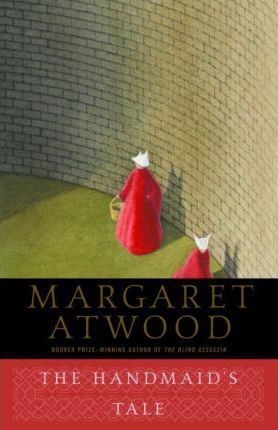
The Handmaid's Tale by Margaret Atwood
Offred is a Handmaid in the Republic of Gilead. She may leave the home of the Commander and his wife once a day to walk to food markets whose signs are now pictures instead of words because women are no longer allowed to read. She must lie on her back once a month and pray that the Commander makes her pregnant, because in an age of declining births, Offred and the other Ha Offred is a Handmaid in the Republic of Gilead. She may leave the home of the Commander and his wife once a day to walk to food markets whose signs are now pictures instead of words because women are no longer allowed to read. She must lie on her back once a month and pray that the Commander makes her pregnant, because in an age of declining births, Offred and the other Handmaids are valued only if their ovaries are viable. Offred can remember the years before, when she lived and made love with her husband, Luke; when she played with and protected her daughter; when she had a job, money of her own, and access to knowledge. But all of that is gone now...
I WANT TO READ THIS
Love in the Time of Cholera by Gabriel García Márquez , Edith Grossman (Translator)
In their youth, Florentino Ariza and Fermina Daza fall passionately in love. When Fermina eventually chooses to marry a wealthy, well-born doctor, Florentino is heartbroken, but he is a romantic. As he rises in his business career he whiles away the years in 622 affairs—yet he reserves his heart for Fermina. Her husband dies at last, and Florentino purposefully attends the In their youth, Florentino Ariza and Fermina Daza fall passionately in love. When Fermina eventually chooses to marry a wealthy, well-born doctor, Florentino is heartbroken, but he is a romantic. As he rises in his business career he whiles away the years in 622 affairs—yet he reserves his heart for Fermina. Her husband dies at last, and Florentino purposefully attends the funeral. Fifty years, nine months, and four days after he first declared his love for Fermina, he will do so again.
I WANT TO READ THIS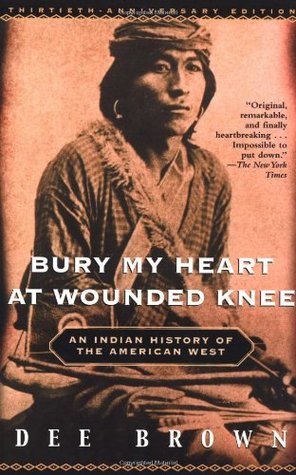
Bury My Heart at Wounded Knee: An Indian History of the American West by Dee Brown
Now a special 30th-anniversary edition in both hardcover and paperback, the classic bestselling history The New York Times called "Original, remarkable, and finally heartbreaking...Impossible to put down." Bury My Heart at Wounded Knee is Dee Brown's eloquent, fully documented account of the systematic destruction of the American Indian during the second half of the ninetee Now a special 30th-anniversary edition in both hardcover and paperback, the classic bestselling history The New York Times called "Original, remarkable, and finally heartbreaking...Impossible to put down." Bury My Heart at Wounded Knee is Dee Brown's eloquent, fully documented account of the systematic destruction of the American Indian during the second half of the nineteenth century. A national bestseller in hardcover for more than a year after its initial publication, it has sold almost four million copies and has been translated into seventeen languages. For this elegant thirtieth-anniversary edition—published in both hardcover and paperback—Brown has contributed an incisive new preface. Using council records, autobiographies, and firsthand descriptions, Brown allows the great chiefs and warriors of the Dakota, Ute, Sioux, Cheyenne, and other tribes to tell us in their own words of the battles, massacres, and broken treaties that finally left them demoralized and defeated. A unique and disturbing narrative told with force and clarity, Bury My Heart at Wounded Knee changed forever our vision of how the West was really won.
I WANT TO READ THIS
The Catcher in the Rye by J.D. Salinger
The hero-narrator of The Catcher in the Rye is an ancient child of sixteen, a native New Yorker named Holden Caulfield. Through circumstances that tend to preclude adult, secondhand description, he leaves his prep school in Pennsylvania and goes underground in New York City for three days. The boy himself is at once too simple and too complex for us to make any final comme The hero-narrator of The Catcher in the Rye is an ancient child of sixteen, a native New Yorker named Holden Caulfield. Through circumstances that tend to preclude adult, secondhand description, he leaves his prep school in Pennsylvania and goes underground in New York City for three days. The boy himself is at once too simple and too complex for us to make any final comment about him or his story. Perhaps the safest thing we can say about Holden is that he was born in the world not just strongly attracted to beauty but, almost, hopelessly impaled on it. There are many voices in this novel: children's voices, adult voices, underground voices-but Holden's voice is the most eloquent of all. Transcending his own vernacular, yet remaining marvelously faithful to it, he issues a perfectly articulated cry of mixed pain and pleasure. However, like most lovers and clowns and poets of the higher orders, he keeps most of the pain to, and for, himself. The pleasure he gives away, or sets aside, with all his heart. It is there for the reader who can handle it to keep. J.D. Salinger's classic novel of teenage angst and rebellion was first published in 1951. The novel was included on Time's 2005 list of the 100 best English-language novels written since 1923. It was named by Modern Library and its readers as one of the 100 best English-language novels of the 20th century. It has been frequently challenged in the court for its liberal use of profanity and portrayal of sexuality and in the 1950's and 60's it was the novel that every teenage boy wants to read.
I WANT TO READ THIS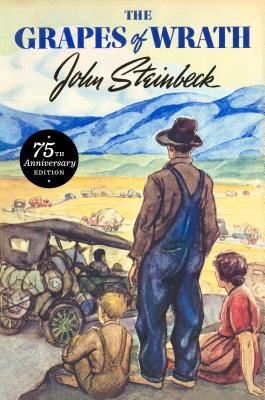
The Grapes of Wrath by John Steinbeck
The Pulitzer Prize-winning epic of the Great Depression, a book that galvanized—and sometimes outraged—millions of readers. First published in 1939, Steinbeck’s Pulitzer Prize-winning epic of the Great Depression chronicles the Dust Bowl migration of the 1930s and tells the story of one Oklahoma farm family, the Joads—driven from their homestead and forced to travel west to The Pulitzer Prize-winning epic of the Great Depression, a book that galvanized—and sometimes outraged—millions of readers. First published in 1939, Steinbeck’s Pulitzer Prize-winning epic of the Great Depression chronicles the Dust Bowl migration of the 1930s and tells the story of one Oklahoma farm family, the Joads—driven from their homestead and forced to travel west to the promised land of California. Out of their trials and their repeated collisions against the hard realities of an America divided into Haves and Have-Nots evolves a drama that is intensely human yet majestic in its scale and moral vision, elemental yet plainspoken, tragic but ultimately stirring in its human dignity. A portrait of the conflict between the powerful and the powerless, of one man’s fierce reaction to injustice, and of one woman’s stoical strength, the novel captures the horrors of the Great Depression and probes into the very nature of equality and justice in America. At once a naturalistic epic, captivity narrative, road novel, and transcendental gospel, Steinbeck’s powerful landmark novel is perhaps the most American of American Classics.
I WANT TO READ THIS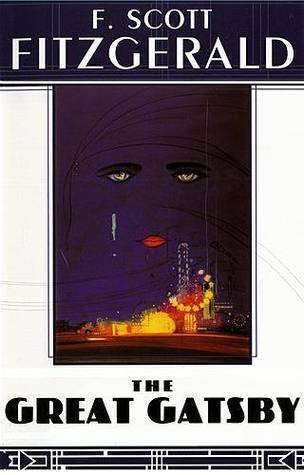
The Great Gatsby by F. Scott Fitzgerald
Alternate Cover Edition ISBN: 0743273567 (ISBN13: 9780743273565) THE GREAT GATSBY, F. Scott Fitzgerald's third book, stands as the supreme achievement of his career. This exemplary novel of the Jazz Age has been acclaimed by generations of readers. The story is of the fabulously wealthy Jay Gatsby and his new love for the beautiful Daisy Buchanan, of lavish parties on Long Alternate Cover Edition ISBN: 0743273567 (ISBN13: 9780743273565) THE GREAT GATSBY, F. Scott Fitzgerald's third book, stands as the supreme achievement of his career. This exemplary novel of the Jazz Age has been acclaimed by generations of readers. The story is of the fabulously wealthy Jay Gatsby and his new love for the beautiful Daisy Buchanan, of lavish parties on Long Island at a time when The New York Times noted "gin was the national drink and sex the national obsession," it is an exquisitely crafted tale of America in the 1920s. The Great Gatsby is one of the great classics of twentieth-century literature. (back cover)
I WANT TO READ THIS
The House of the Spirits by Isabel Allende , Magda Bogin (Translator)
In one of the most important and beloved Latin American works of the twentieth century, Isabel Allende weaves a luminous tapestry of three generations of the Trueba family, revealing both triumphs and tragedies. Here is patriarch Esteban, whose wild desires and political machinations are tempered only by his love for his ethereal wife, Clara, a woman touched by an otherwor In one of the most important and beloved Latin American works of the twentieth century, Isabel Allende weaves a luminous tapestry of three generations of the Trueba family, revealing both triumphs and tragedies. Here is patriarch Esteban, whose wild desires and political machinations are tempered only by his love for his ethereal wife, Clara, a woman touched by an otherworldly hand. Their daughter, Blanca, whose forbidden love for a man Esteban has deemed unworthy infuriates her father, yet will produce his greatest joy: his granddaughter Alba, a beautiful, ambitious girl who will lead the family and their country into a revolutionary future. The House of the Spirits is an enthralling saga that spans decades and lives, twining the personal and the political into an epic novel of love, magic, and fate.
I WANT TO READ THIS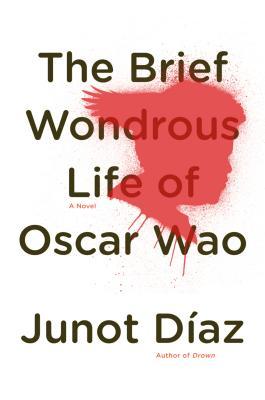
The Brief Wondrous Life of Oscar Wao by Junot Díaz
Things have never been easy for Oscar, a sweet but disastrously overweight, lovesick Dominican ghetto nerd. From his home in New Jersey, where he lives with his old-world mother and rebellious sister, Oscar dreams of becoming the Dominican J. R. R. Tolkien and, most of all, of finding love. But he may never get what he wants, thanks to the Fukœ—the curse that has haunted t Things have never been easy for Oscar, a sweet but disastrously overweight, lovesick Dominican ghetto nerd. From his home in New Jersey, where he lives with his old-world mother and rebellious sister, Oscar dreams of becoming the Dominican J. R. R. Tolkien and, most of all, of finding love. But he may never get what he wants, thanks to the Fukœ—the curse that has haunted the Oscar's family for generations, dooming them to prison, torture, tragic accidents, and, above all, ill-starred love. Oscar, still waiting for his first kiss, is just its most recent victim. Diaz immerses us in the tumultuous life of Oscar and the history of the family at large, rendering with genuine warmth and dazzling energy, humor, and insight the Dominican-American experience, and, ultimately, the endless human capacity to persevere in the face of heartbreak and loss. A true literary triumph, The Brief Wondrous Life of Oscar Wao confirms Junot Diaz as one of the best and most exciting voices of our time.
I WANT TO READ THIS
The Last Days of the Incas by Kim MacQuarrie
Kim MacQuarrie lived in Peru for five years and became fascinated by the Incas and the history of the Spanish conquest. Drawing on both native and Spanish chronicles, he vividly describes the dramatic story of the conquest, with all its savagery and suspense. This authoritative, exciting history is among the most powerful and important accounts of the culture of the South Kim MacQuarrie lived in Peru for five years and became fascinated by the Incas and the history of the Spanish conquest. Drawing on both native and Spanish chronicles, he vividly describes the dramatic story of the conquest, with all its savagery and suspense. This authoritative, exciting history is among the most powerful and important accounts of the culture of the South American Indians and the Spanish Conquest.
I WANT TO READ THIS
White Working Class: Overcoming Class Cluelessness in America by Joan C. Williams
Around the world, populist movements are gaining traction among the white working class. Meanwhile, the professional elite—journalists, managers, and establishment politicians—is on the outside looking in, and left to argue over the reasons why. In White Working Class, Joan C. Williams, described as “something approaching rock star status” in her field by the New York Time Around the world, populist movements are gaining traction among the white working class. Meanwhile, the professional elite—journalists, managers, and establishment politicians—is on the outside looking in, and left to argue over the reasons why. In White Working Class, Joan C. Williams, described as “something approaching rock star status” in her field by the New York Times, explains why so much of the elite’s analysis of the white working class is misguided, rooted in assumptions by what she has controversially coined “class cluelessness.” Williams explains how most analysts, and the corresponding media coverage, have conflated “working class” with “poor.” All too often, white working class motivations have been dismissed as simply racism or xenophobia. Williams explains how the term “working class” has been misapplied—it is, in fact, the elusive, purportedly disappearing middle class. This demographic often resents both the poor and the professionals. They don’t, however, tend to resent the truly rich, nor are they particularly bothered by income inequality. Their dream is not to join the upper middle class, with its different culture, but to stay true to their own values in their own communities—just with more money. White Working Class is a blunt, bracing narrative that sketches a nuanced portrait of millions of people throughout the world who have proven to be a potent political force. For anyone stunned by the rise in populist, nationalist movements, wondering why so many would seemingly vote against their own economic interests or simply feeling like a stranger in their own country, White Working Class will be a convincing primer on how to connect with a crucial set of workers—and voters.
I WANT TO READ THIS
Maya to Aztec: Ancient Mesoamerica Revealed by Edwin Barnhart
23 hours 15 mins Centuries ago, Spanish conquistadors searching for gold and new lands encountered a group of independent city-states in Mesoamerica. Sophisticated beyond the Spaniards' wildest imaginings, these people were the Aztecs, the Maya, and related cultures that shared common traditions of religion, government, the arts, engineering, and trade. In many ways more ad 23 hours 15 mins Centuries ago, Spanish conquistadors searching for gold and new lands encountered a group of independent city-states in Mesoamerica. Sophisticated beyond the Spaniards' wildest imaginings, these people were the Aztecs, the Maya, and related cultures that shared common traditions of religion, government, the arts, engineering, and trade. In many ways more advanced than European nations, these societies equaled the world's greatest civilizations of their time. Immerse yourself in this epic story with 48 exhilarating half-hour lectures that cover the scope of Mesoamerican history and culture. You'll focus mainly on the Maya, who have been in Mesoamerica for thousands of years, and the Aztecs, who mysteriously appeared late and rose swiftly to power. The Aztecs fell from power just as precipitously; their empire controlled the region for less than a century, until the arrival of the Spanish in the early 1500s. Why were the Aztecs so quickly defeated by the conquistadors, while the Maya resisted the invaders for generations? Although the Spanish eventually conquered all of Mesoamerica, much remains of the original cultures. Beautiful artifacts fill museums. Impressive ruins dot the landscape. And millions of descendants of ancient Mesoamericans still live in their ancestral homes, speaking native languages and practicing time-honored traditions. The countries from Mexico to Costa Rica include more than a dozen UNESCO World Heritage Sites related to the pre-Columbian period, plus scores of other ancient sites that are equally worth a visit. This course is the ideal way to plan an itinerary, prepare for a tour, or simply sit back and enjoy a thrilling virtual voyage. You will be surprised at the number of sites to explore - many more than you could possibly see in months of travel. Your guide is Professor Barnhart, a noted archaeologist whose exploits include the discovery of a lost Maya city. ©2015 The Great Courses (P)2015 The Teaching Company, LLC
I WANT TO READ THIS
Back Channel by Stephen L. Carter
October 1962. The Soviet Union has smuggled missiles into Cuba. Kennedy and Khrushchev are in the midst of a military face-off that could lead to nuclear conflagration. Warships and submarines are on the move. Planes are in the air. Troops are at the ready. Both leaders are surrounded by advisers clamoring for war. The only way for the two leaders to negotiate safely is to October 1962. The Soviet Union has smuggled missiles into Cuba. Kennedy and Khrushchev are in the midst of a military face-off that could lead to nuclear conflagration. Warships and submarines are on the move. Planes are in the air. Troops are at the ready. Both leaders are surrounded by advisers clamoring for war. The only way for the two leaders to negotiate safely is to open a “back channel”—a surreptitious path of communication hidden from their own people. They need a clandestine emissary nobody would ever suspect. If the secret gets out, her life will be at risk . . . but they’re careful not to tell her that. Stephen L. Carter’s gripping new novel, Back Channel, is a brilliant amalgam of fact and fiction—a suspenseful retelling of the Cuban Missile Crisis, in which the fate of the world rests unexpectedly on the shoulders of a young college student. On the island of Curaçao, a visiting Soviet chess champion whispers state secrets to an American acquaintance. In the Atlantic Ocean, a freighter struggles through a squall while trying to avoid surveillance. And in Ithaca, New York, Margo Jensen, one of the few black women at Cornell, is asked to go to Eastern Europe to babysit a madman. As the clock ticks toward World War III, Margo undertakes her harrowing journey. Pursued by the hawks on both sides, protected by nothing but her own ingenuity and courage, Margo is drawn ever more deeply into the crossfire—and into her own family’s hidden past.
I WANT TO READ THIS
The Bone Seeker by M.J. McGrath
The intrepid Edie Kiglatuk discovers one of her female students dead in a toxic lake in her third arctic mystery In the third novel in this highly praised mystery series that will appeal to fans of The Killing, Top of the Lake, and The Bridge, Edie Kiglatuk works as a summer school teacher in the Canadian arctic. When one of her female students is found dead in nearby Lake The intrepid Edie Kiglatuk discovers one of her female students dead in a toxic lake in her third arctic mystery In the third novel in this highly praised mystery series that will appeal to fans of The Killing, Top of the Lake, and The Bridge, Edie Kiglatuk works as a summer school teacher in the Canadian arctic. When one of her female students is found dead in nearby Lake Turngaluk, Edie enlists the help of Sergeant Derek Palliser to pursue the case, promising the girl’s Inuit family that they will uncover the truth. Meanwhile, lawyer Sonia Gutierrez investigates the toxicity of the lake and suspects that there might be a larger conspiracy involved. As the three clamber over rocky terrain under twenty-four-hour daylight they start to unearth secrets long frozen over—risking their own lives in the process. With stunning prose, M. J. McGrath delivers another thrill ride through a hauntingly beautiful landscape.
I WANT TO READ THIS
Masters of Empire: Great Lakes Indians and the Making of America by Michael A. McDonnell
In Masters of Empire, the historian Michael A. McDonnell reveals the pivotal role played by the native peoples of the Great Lakes in the history of North America. Though less well known than the Iroquois or Sioux, the Anishinaabeg, who lived across Lakes Michigan and Huron, were equally influential. Masters of Empire charts the story of one group, the Odawa, who settled at In Masters of Empire, the historian Michael A. McDonnell reveals the pivotal role played by the native peoples of the Great Lakes in the history of North America. Though less well known than the Iroquois or Sioux, the Anishinaabeg, who lived across Lakes Michigan and Huron, were equally influential. Masters of Empire charts the story of one group, the Odawa, who settled at the straits between those two lakes, a hub for trade and diplomacy throughout the vast country west of Montreal known as the pays d’en haut. Highlighting the long-standing rivalries and relationships among the great Indian nations of North America, McDonnell shows how Europeans often played only a minor role in this history, and reminds us that it was native peoples who possessed intricate and far-reaching networks of commerce and kinship, of which the French and British knew little. As empire encroached upon their domain, the Anishinaabeg were often the ones doing the exploiting. By dictating terms at trading posts and frontier forts, they played a crucial part in the making of early America. Through vivid depictions—all from a native perspective—of early skirmishes, the French and Indian War, and the American Revolution, Masters of Empire overturns our assumptions about colonial America. By calling attention to the Great Lakes as a crucible of culture and conflict, McDonnell reimagines the landscape of American history.
I WANT TO READ THIS
Pay Any Price: Greed, Power, and Endless War by James Risen
War corrupts. Endless war corrupts absolutely. Ever since 9/11 America has fought an endless war on terror, seeking enemies everywhere and never promising peace. In Pay Any Price, James Risen reveals an extraordinary litany of the hidden costs of that war: from squandered and stolen dollars, to outrageous abuses of power, to wars on normalcy, decency, and truth. In the name War corrupts. Endless war corrupts absolutely. Ever since 9/11 America has fought an endless war on terror, seeking enemies everywhere and never promising peace. In Pay Any Price, James Risen reveals an extraordinary litany of the hidden costs of that war: from squandered and stolen dollars, to outrageous abuses of power, to wars on normalcy, decency, and truth. In the name of fighting terrorism, our government has done things every bit as shameful as its historic wartime abuses — and until this book, it has worked very hard to cover them up. Lincoln suspended habeas corpus. FDR authorized the internment of thousands of Japanese Americans. Presidents Bush and Obama now must face their own reckoning. Power corrupts, but it is endless war that corrupts absolutely.
I WANT TO READ THIS
Lies My Teacher Told Me about Christopher Columbus: What Your History Books Got Wrong by James W. Loewen
In Lies My Teacher Told Me About Christopher Columbus, the bestselling author of Lies My Teacher Told Me offers a graphic corrective to the Columbus story told in so many American classrooms. First published over fifteen years ago and long out-of-print, the poster and accompanying paperback book sum up the mis-tellings—and reveal the real story—in a graphically appealing a In Lies My Teacher Told Me About Christopher Columbus, the bestselling author of Lies My Teacher Told Me offers a graphic corrective to the Columbus story told in so many American classrooms. First published over fifteen years ago and long out-of-print, the poster and accompanying paperback book sum up the mis-tellings—and reveal the real story—in a graphically appealing and accessible format. In vintage Loewen fashion, the poster juxtaposes short quotes from a range of high school textbooks currently in use, with excerpts from primary sources that clearly show how textbooks have "lied" by knowingly substituting crowd-pleasing myths for grim and gruesome historical evidence. In fact, these textbooks intentionally omitted every important detail that we do know about Columbus’s fateful voyage to the Americas. Among countless other facts, Loewen demonstrates that Columbus and his men were far from the first to set foot in the "New World," and that the peoples he encountered there did not submit to the "god-like" authority of him and his crewmen, but rather to the deadly forms of smallpox and bubonic plague they brought with them from Europe. In concise, deeply engaging prose, Loewen expands on these little-discussed facts, putting them in the larger context of a discussion of "truth" and revisionist history.
I WANT TO READ THIS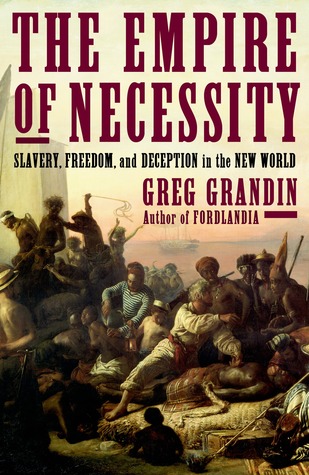
The Empire of Necessity: Slavery, Freedom, and Deception in the New World by Greg Grandin
From the acclaimed author of Fordlandia, the story of a remarkable slave rebellion that illuminates America’s struggle with slavery and freedom during the Age of Revolution and beyond. One morning in 1805, off a remote island in the South Pacific, Captain Amasa Delano, a New England seal hunter, climbed aboard a distressed Spanish ship carrying scores of West Africans he th From the acclaimed author of Fordlandia, the story of a remarkable slave rebellion that illuminates America’s struggle with slavery and freedom during the Age of Revolution and beyond. One morning in 1805, off a remote island in the South Pacific, Captain Amasa Delano, a New England seal hunter, climbed aboard a distressed Spanish ship carrying scores of West Africans he thought were slaves. They weren’t. Having earlier seized control of the vessel and slaughtered most of the crew, they were staging an elaborate ruse, acting as if they were humble servants. When Delano, an idealistic, anti-slavery republican, finally realized the deception, he responded with explosive violence. Drawing on research on four continents, The Empire of Necessity explores the multiple forces that culminated in this extraordinary event—an event that already inspired Herman Melville’s masterpiece Benito Cereno. Now historian Greg Grandin, with the gripping storytelling that was praised in Fordlandia, uses the dramatic happenings of that day to map a new transnational history of slavery in the Americas, capturing the clash of peoples, economies, and faiths that was the New World in the early 1800s.
I WANT TO READ THIS